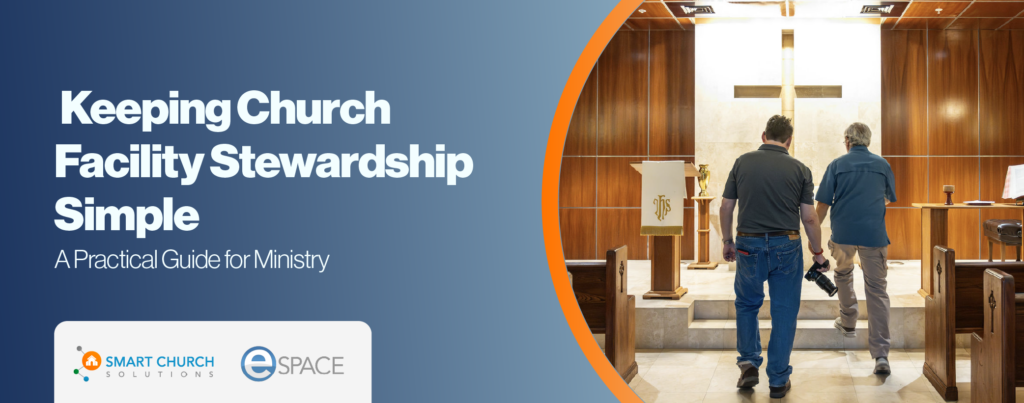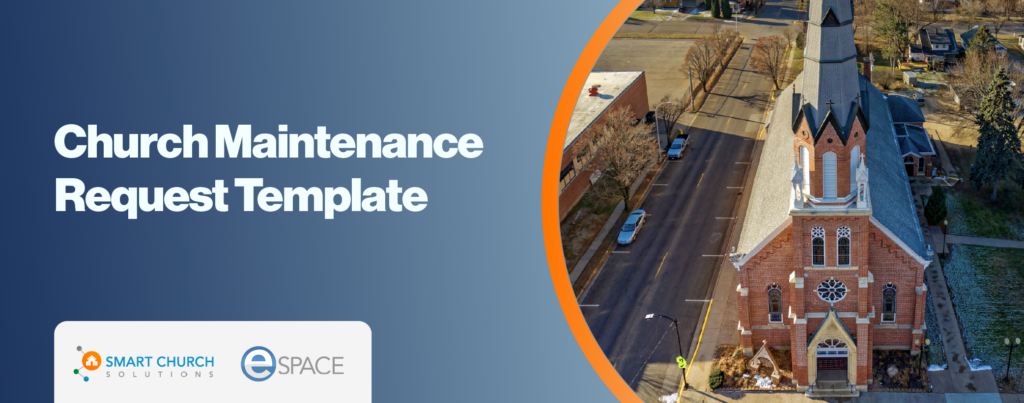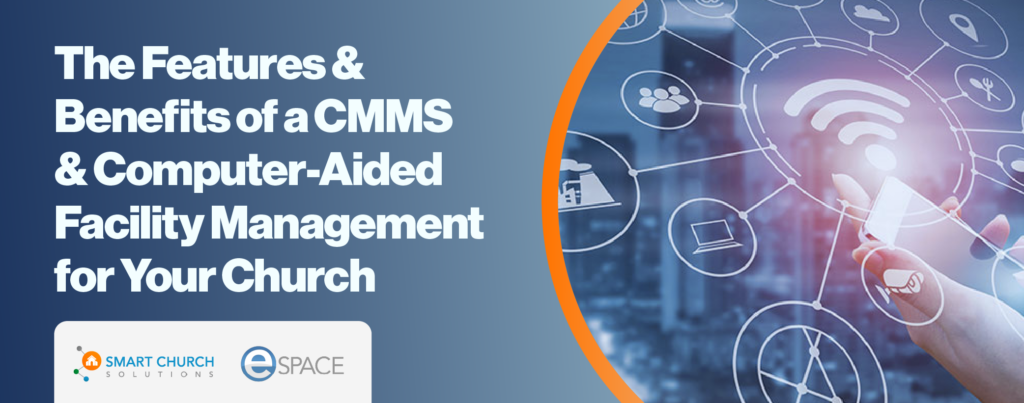The answer is very simple: if your church or organization owns a facility, maintains a facility, or cares for a facility, you need facility management software.
Like most software applications, facility management software is meant to increase efficiency and effectiveness of your team.
What Is Facility Management Software?
A facility management software or CMMS (Computerized Maintenance Management System) is defined as a software package that maintains a computer database of information about an organization’s maintenance operations.
In short, facility management software can assist with many things, but to highlight a few:
- Report Corrective Maintenance issues
- Track work performed, who performed it, and approved completion
- Schedule and assign preventative maintenance tasks
- Make it as easy as possible for users to submit work orders
- Track costs of labor, parts, etc.
- Manage internal and external vendors
- Review history logs
- Track inventory
Software is not your enemy. Instead, it should be embraced as your friend and ally. It exists for the sole purpose of helping facility staff perform at a higher level than they would without it. Let’s look at some of the primary reasons why this is true:
Questions Your Team May Ask
Your facility team is likely asking themselves many questions throughout the day. Where do they go to find the answer to? See popular questions your team may ask below:
What do I do today?
Church staff, especially the facility staff, often has many tasks at hand. It can become very cumbersome for them to organize and sort each task based on priority, nature, and relevance. Intentional facility management software provides an effective structure where details are outlined. It also notifies the team on what sort of service is needed.
An important feature is the ability to put a ‘priority’ tag on important work requests. This helps your team, including vendors and suppliers, to prioritize the high-importance tasks. There should not be any misunderstanding of what needs to be done along with the priority of the tasks at hand.
Who should do THAT?
We know “what” needs to be done, but do we know who the tasks should be assigned to specifically? With a proper assignment of tasks, you prevent your team from wondering “who’s on first.” Without a clear and concise method to assign work orders, one of two things is happening. Either everyone on your team is doing one task, or worse, no one on your team is doing any tasks.
Wasn’t that done last week?
We have witnessed situations where people think work was completed, but there was no paper trail or documentation (I am sure this has never happened at your church). As you may know, this causes confusion and frustration.
Utilizing facility management software can help eliminate those instances by tracking and recording the “history” of work orders. Reduce your stress. DOCUMENT!
Another motive of tracking work orders is to track the trends of work orders for future reference. If HVAC unit #2 has had five work orders in the past two months, you may need to take a more significant approach to the vendor you are using. Or you need to determine the unit’s life expectancy and compare it to the amount spent just to maintain the unit. This can save you both time and money (or is time money…you get the point).
How did we run out of toilet paper?
Church facility teams have a load of work to complete daily. Meanwhile, they forget about identifying the minimal, yet important, consumable inventories that require scheduled work orders. The absence of the stock of these essential items can be annoying and downright inconvenient (as in the case of no toilet paper).
If you utilize a facility management software with asset and inventory tracking capabilities, you can keep a close eye on the stocks of all the consumable and non-consumable items by setting up a notification system or a stock updating alarm-like system.
When did we change the HVAC filters last?
Facility management software can identify, track, and address what is referred to as “corrective” maintenance. For instance, an example of corrective maintenance would be a clogged toilet in the kid’s wing.
One of the most critical types of maintenance for a church facility team to stay on top of is the “preventive” maintenance items. These are the recurring maintenance items that, if performed as needed or recommended, can extend the life of the system and equipment.
A few examples of preventative maintenance would be quarterly replacement of HVAC filters, annual water heater flushing, monthly elevator inspections, annual fire extinguisher inspections, etc.
The right facility management software can help keep you on track with reminders and auto-generated work orders. Preventive Maintenance is an essential and critical aspect of any facility management and maintenance plan. Being a Facility Steward means you are looking at the future.
How much will it cost to replace the Roof and HVAC units down the road?
These are not questions anyone on your facility team should ever need to ask. With intentional and proactive Life Cycle Planning, your team, including your church administrator and finance team, should have this information at their fingertips.
A proper facility management software helps show the Remaining Useful Life of all your major equipment and systems. It also shows the current replacement value, a rate of inflation and calculator as to how much money should be set aside annually so you have adequate funds when the time for replacement arrives. No surprises!
How much did that cost, and how long did it take us to complete the work order?
One of my favorite quotes attributed to Mr. Max Dupree is:
“Even if angels ran the company, they would have to make a profit.”
When referring to church work, the term “profit” can be off-putting. However, the reality is we need to bring in more than we spend. We need to be intentional when spending the money entrusted to us with the same care as the entrusted facilities.
In light of that, you need a facility management software that can help you track the costs of work in place as well as the time it takes our team to perform the work. Time is money, so the waste of time is a waste of money.
In Summary
These are just the initial reasons why your church needs to have a proactive, easy-to-use, and effective facility management software. If this is not on your radar, it needs to be.
To learn more about eSPACE, the best church facility management software on the market, just go here! You can also book a demo with one of our specialists by hitting the button below!








